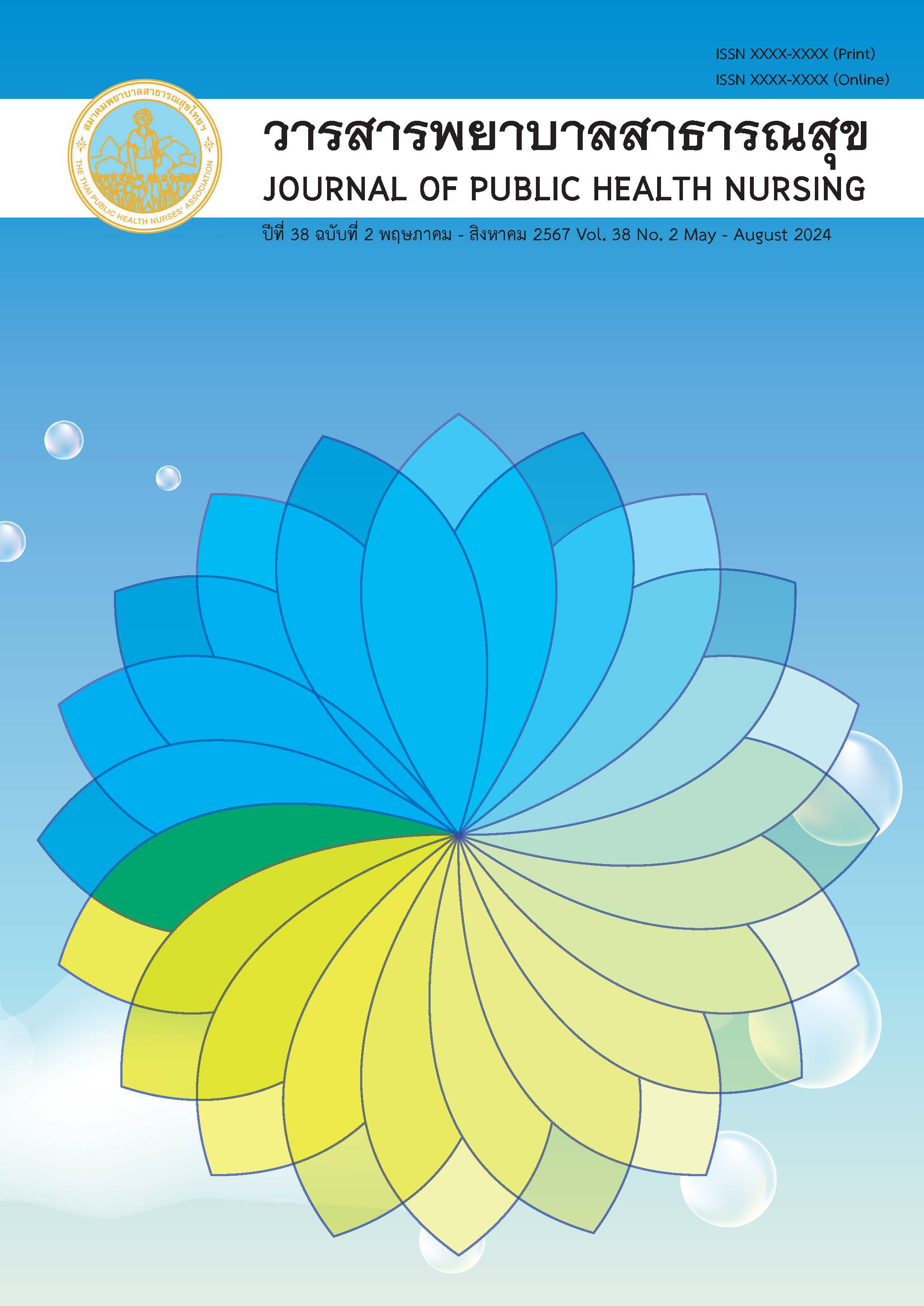The Effect of a Health Literacy Enhancement Program on Stroke Prevention Behaviors and Clinical Health Outcomes among High-Risk Chronic Non-communicable Diseases Patients
Keywords:
Health literacy, Cerebrovascular diseaseAbstract
This quasi-experimental research aimed to investigate the effect of a health literacy enhancement program on stroke prevention behaviors and clinical health outcomes among high-risk chronic non-communicable disease patients. Sample was patients with chronic non-communicable diseases who were at risk for stroke. The assessment was conducted using the Thai CV Risk Score between November 2023 and January 2024. The experimental tools included a health literacy program for stroke prevention, incorporating the Health Literacy and Participatory Learning framework, duration of activities for a total of 5 weeks. Data collection involved the assessment of personal information, stroke prevention behaviors, and clinical health outcomes record. The data analyzed utilized descriptive statistics, paired t-test, and independent t-test, with statistical significance level set at .05.
The results indicated that patients in the experiment group, who had high-risk chronic non-communicable diseases, demonstrated higher average scores in stroke prevention behaviors and clinical health outcomes after participating in the program and those in the control group (p < .001). The health literacy enhancement program should be implemented for all chronic non-communicable disease patients. This program should emphasize on access to accurate and reliable health knowledge in order to facilitate the planning of health behavior modification that can lead to improved clinical health outcomes, prevention of complications, and effectively stroke prevention.
References
Feigin VL, Brainin M, Norrving B, Martins S, Sacco. L, Hacke W, et al. World Stroke Organization (WSO): Global Stroke Fact Sheet 2022. Int J Stroke [Internet]. 2022 [cited 2023 Sep 20]; 17(1): 18-29. Available from: https:// doi: 10.1177/17474930211065917
GBD 2019 Stroke Collaborators. Global, regional, and national burden of stroke and its risk factors, 1990–2019: a systematic analysis for the Global Burden of Disease Study 2019. Lancet Neurol 2021; 20: 795-820.
Tiamkao S. Incidence of stroke in Thailand. Thai Journal of Neurology 2022; 3(2): 39-46. (In Thai)
Han J, Mao W, Ni J, Wu Y, Liu J, Bai L, et al. Rate and determinants of recurrence at 1 year and 5 years after stroke in low–income population in rural China. Front Neurol [Internet]. 2020 Jan [cited 2023 Oct 2]; 11(2): 1-9. Available from: https://doi.org/10.3389/fneur.2020.00002
Division of Non-Communicable Diseases, Ministry of Public Health. Number and death rate from 5 non-communicable diseases (NCD) 2017 – 2021. [Internet]. [cited 2023 Sep 25]. Available from: http://www.thaincd.com/2016/mission3 (In Thai)
Bureau of Risk Communication and Health Behavior Development. Manual of creating health literacy process in the prevention and control of disease and health hazards. Bangkok: RNPP Water; 2021.
Nutbeam D. The evolving concept of Health Literacy. Social Science & Medicine 2008; 67: 2072-78.
Nilnate W, Rungchutiphopan W. Health Literacy and Nursing Professionals. Quality of Life and Law Journal July-December 2019; 15(2): 1-18. (In Thai)
Chahardah-Cherik S, Gheibizadeh M, Jahani S, Cheraghian B. The relationship between health literacy and health promoting behaviors in patients with type 2 diabetes. International journal of community-based nursing and midwifery 2018; 6(1): 65-75.
Department of Mental Health. Training manual about participatory learning. [Internet]. 2000 [cited 2023 Oct 12]. Available from: http://mhtech.dmh.moph.go.th/techno/ techno_other/ index.html. (In Thai)
Kang H. Sample size determination and power analysis using the G*Power software. Journal of educational evaluation for health professions 2021; 18:17.
Manatura O. Result of the Health Literacy Development Program of Stroke Alert and the Access to an Emergency Medical Service in High-Risk Patients with Hypertension and Their Relatives in Tambon Chakkarat, Chakkarat District, Nakhon Ratchasima. The Journal for Health Promotion and Environmental Health 2019; 13(32): 206-21. (In Thai)
Watcharanurak P, Klubklay A. Factors Influencing Preventive Behavior among Stoke-Risk Patients in Songkhla Province. SCNJ 2017; 4(1): 217-33. (In Thai)
Ismail FKM, Zubairi AMB. Item Objective Congruence Analysis for Multidimensional Items. English Language Teaching 2022; 15(1): 106-17.
Samanmit C, Boontae U, Rungnoei N. Health Literacy Development Model for Preventing Stroke Disease among Patients with High Risk of Stroke in Primary Care Units, Phetchaburi Province. Region 4-5 Medical Journal July-September 2020; 39(3): 344-63. (In Thai)
Chiangpiew N, Boonchieng W, Aungwattan S. Effects of Participatory Learning Regarding Stroke Prevention on Knowledge and Self-efficacy among Village Health Volunteers. Nursing Journal 2018; 45(1): 87-99. (In Thai)
Tongpeth J, Butphum C, Dechpoonyachit P, Saengdaeng A. The Effect of Participatory Learning with PBRI Model 2022 Program on Knowledge Attitude and Stroke Prevention Behavior among Village Health Volunteers. Journal of The Royal Thai Army Nurses 2022; 23(3): 227-37. (In Thai)
Tongpeth J, Som-jai C. The effect of the enhancing empowerment and health literacy developing program on health literacy, Stroke prevention behaviors and clinical outcomes among the stroke high-risk group. Thai Journal of Cardio-Thoracic Nursing July-December 2022; 33(2): 130-46. (In Thai)
Stormacq C, Wosinski J, Boillat E, Van den Broucke S. Effects of health literacy interventions on health-related outcomes in socioeconomically disadvantaged adults living in the community: a systematic review. JBI Evidence Synthesis [Internet]. 2020 [cited 2024 Jan 14]; 18(7): 1389-1469. Available from: https://doi: 10.11124/JBISRIR-D-18-00023
Downloads
Published
How to Cite
Issue
Section
License
Copyright (c) 2024 Thai Public Health Nurses Association

This work is licensed under a Creative Commons Attribution-NonCommercial-NoDerivatives 4.0 International License.
บทความที่ตีพิมพ์และแผนภูมิรูปภาพถือเป็นลิขสิทธิ์ของวารสารพยาบาลสาธารณสุข (Thai Public Health Nurses Association)







